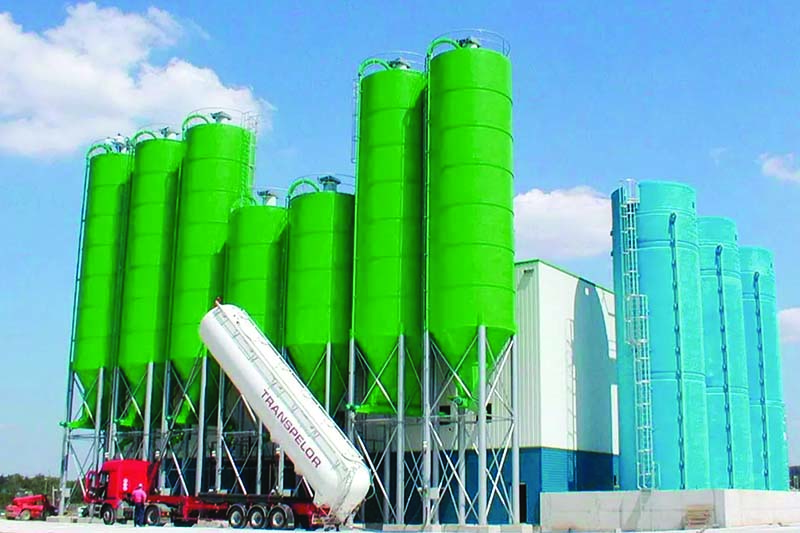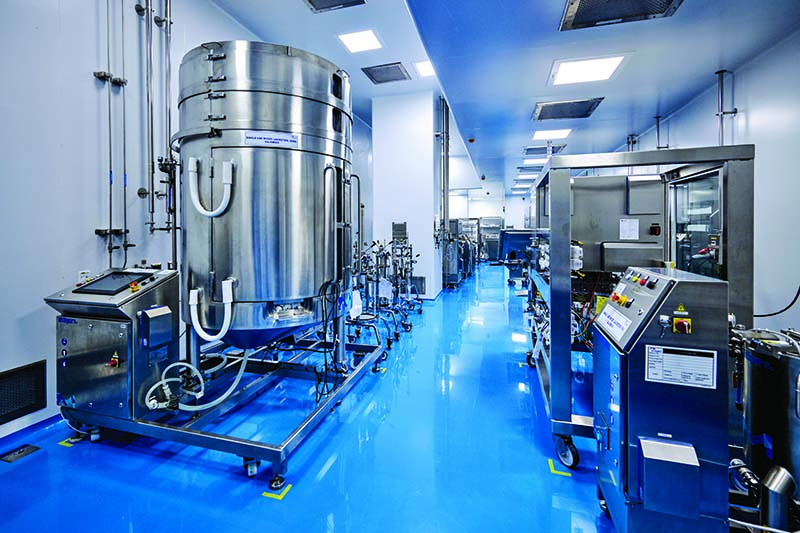German biotechs BioNTech and CureVac have entered into a definitive purchase agreement under which BioNTech intends to acquire all of the shares of CureVac, a clinical-stage company developing a class of medicines in oncology and infectious diseases based on messenger ribonucleic acid (mRNA). The all-stock transaction will bring together two complementary companies based in Germany and will build on BioNTech’s track record and established position in the global mRNA industry.
TQ Therapeutics, a German biotech developing cellular therapies, has acquired Juno Therapeutics, a German cell therapy company and subsidiary of US biopharma Juno Therapeutics Inc, a wholly owned subsidiary of the US biopharma Bristol Myers Squibb.
At its Lavera site in southern France, Belgian manufacturer INEOS Olefins & Polymers (a subsidiary of UK chemical company INEOS Group), has received the first deliveries of an innovative feedstock made from recycled plastic waste. Pyrolysis oil will be used to manufacture recycled polymers, helping its customers meet the EU requirements for food contact, medical and sensitive plastic packaging to have a minimum of 10% recycled content by 2030. These new grades will help satisfy stringent EU regulatory requirements for other demanding applications such as caps and closures, milk bottles and water pipes.
German pharma Bayer and The Broad Institute, a US multidisciplinary community of human health researchers, have extended their research collaboration of 10 years by an additional five years, to further advance findings in human genomics research in cardiovascular diseases. The expanded agreement will focus on joint precision cardiology target identification, leveraging their established human cardiomyocyte platform to rapidly validate observations, leading to the discovery of novel therapeutic approaches.
US research company Deep Apple Therapeutics has signed a research collaboration and exclusive worldwide license agreement with Danish healthcare company Novo Nordisk to discover, develop and commercialise oral small-molecule therapeutics directed at a novel non-incretin GPCR target for cardiometabolic diseases, including obesity. Under the terms of the agreement, Deep Apple will discover and optimise compounds using its proprietary drug discovery platform, which combines machine-learning-powered virtual screening with structural biology enabled by cryo-electron microscopy (cryo-EM) to improve speed, quality and novelty in lead generation and optimisation.
US specialty chemicals company Lubrizol has opened a new office in Hammersmith, London. UK. The new site will be home to a variety of business functions, including sales and European leadership, adding to its existing footprint across the UK, Spain, Belgium, Netherlands, France and Germany.
Belgian advanced materials company Syensqo has announced the inauguration of its microbiology, (eco-)toxicology and biotechnology labs in Lyon, France. This new facility is the company’s largest microbiology lab, serving as a reference centre in the field. It enhances Syensqo’s biodegradation and (eco-)toxicology testing capabilities right from the early stages of product development, accelerating the development of environmentally friendly and safe products through its Renewable Materials and Biotechnology Growth Platform.
A new UK project, co-led by Joshua James and Patrick Cai of the Manchester Institute of Biotechnology at The University of Manchester, in collaboration with the John Innes Centre and Earlham Institute, will look at how engineering biology technologies can be developed and used to help feed a growing population while protecting crops against climate change-related catastrophes and pests. The project will focus on potatoes. Funded by a £8.5m grant from the UK Government’s Advanced Research and Invention Agency, the researchers will leverage advances in engineering biology to establish synthetic plant chromosome (synPAC) technologies. These technologies promise to provide powerful new ways of introducing novel traits to plants – such as producing essential nutrients or increased pest resistance – while maintaining the plant’s existing characteristics.
Yanfeng China, a leading supplier of automotive interior parts, has selected ELIX Polymers PC/ABS 5130 for interior components of the new SGM Buick GL8.
Italian biotech Philochem, a wholly owned subsidiary of US pharma Bristol Myers Squibb, has signed an agreement licensing the exclusive worldwide rights to develop, manufacture and commercialise OncoACP3, a clinical-stage therapeutic and diagnostic agent targeting prostate cancer, to Rayzebio, a biotech focused on developing targeted radiopharmaceutical drugs for solid tumours in cancers.
Meteor Biotech, a South Korean specialised spatial omics technology company producing region-targeted cell sorting devices for advanced biomedical research, has opened a US office, its first international investment. The new facility is located at the California NanoSystems Institute – an interdisciplinary research centre at UCLA (University California, Los Angeles). The new facility is designed to give researchers and drug developers across a wide range of fields – including oncology, neurology, immunology and biomarker discovery – enhanced access to Meteor’s proprietary spatial cell sorter powered by SLACS (Spatially-Resolved Laser-Activated Cell Sorting) technology.
French pharma and healthcare company Sanofi has entered into a $470m agreement to acquire Vigil Neuroscience, a US clinical-stage biotech focused on developing therapies for neurodegenerative diseases.
US biopharma Bio Usawa, which has bases in San Francisco, Rwandan capital Kigali and Kenyan capital Nairobi, has announced an agreement with US medial contractor Pacific Environmental Technologies, a manufacturer of cleanroom facilities, to design, build and deploy state-of-the-art, self-contained modular biomanufacturing units. The modules are engineered for rapid deployment and tailored for resource-limited environments. The first unit will be based in Kigali by the end of 2025 and will enable local production of monoclonal antibody-based therapies for diabetic macular oedema, with future plans for HER2-positive breast and other cancers, non-Hodgkin’s lymphoma, rheumatoid arthritis, and other serious unmet medical needs.
€400bn
Despite impending mandates and ambitious corporate targets, chemical recycling in Europe remains nascent, mostly due to unattractive economics. A new report published by US consultancy Bain & Company reveals that the industry is worth over €400bn in cumulative capex, and cost parity with virgin plastics production could be achieved in 20-30 years. Plastics companies now have a window of opportunity to be early movers and reap material benefits.
60,000L
Chinese CRDMO WuXi Biologics has started construction of its new microbial manufacturing site in the Wenjiang district of Chengdu. The new site is dedicated to a drug substance (DS) facility and a drug product facility for commercial manufacturing. These will encompass a wide array of modalities, from peptides and enzymes to cytokines and virus-like particles. Scheduled for completion in 2026, the site will be equipped with a 15,000L fermenter, enabling an annual production capacity of 80 to 110 DS batches. In the long run, capacity will expand to 60,000L.
50%
Belgian-French chemical company Solvay and German chemicals company BASF are to jointly focus on a reduction in Scope 3 greenhouse gas emissions in the hydrogen peroxide supply chain. Solvay has selected BASF as the primary supplier of aluminum chloride for its Linne Herten plant in the Netherlands, a key input in the production of anthraquinone, which is essential for manufacturing hydrogen peroxide. BASF was chosen for its ability to provide aluminum chloride with a 50% lower carbon footprint compared with Solvay’s previous sourcing.
x3
Austrian polyolefin provider Borealis has reinforced its commitment to sustainable manufacturing with the announcement of a €100m investment in its production site at Burghausen, Germany. The new production line will triple capacity to supply a recyclable high melt strength polypropylene (HMS PP) foam material, called Daploy. The start-up of the new line is planned for the second half of 2026.
Global gases, advanced materials and engineering company Linde is doubling the capacity of its Freeport, Texas, CO2 production facility by adding a second liquefaction plant. Starting up in 2027, the new plant will liquefy crude CO2 captured from US chemical manufacturer MEGlobal America’s Oyster Creek ethylene glycol facility, which Linde also supplies with oxygen from its Freeport air separation plant. The increased capacity will help Linde meet growing industry demand for reliable CO2 supply across diverse applications, including carbonating beverages, preserving food quality, manufacturing dry ice, producing low-carbon fuels and chemical synthesis processes.
US aerospace manufacturer and space infrastructure technology company Redwire Corporation has been awarded a contract from US pharma Aspera Biomedicines, which specialises in the development of cancer stem cell targeted therapies, to conduct space-based research and analysis on a new cancer treatment using Redwire’s Pharmaceutical In-space Laboratory (PIL-BOX) technology.
US pharma Eli Lilly is to acquire SiteOne Therapeutics, a private US biotech developing small-molecule inhibitors of sodium channels to treat pain and other neuronal hyperexcitability disorders.
The UK’s Henry Royce Institute has launched the Digital Materials Foundry, a new initiative aimed at transforming the methods, rate of discovery, design and deployment of new materials. This new programme is part of a wider effort to accelerate the digital transformation of materials science – supporting a new era of Materials 4.0. Embracing artificial intelligence, machine learning and open-access materials data, the Foundry provides a digital infrastructure designed to support innovation across academia, industry and government. It brings together existing resources – from experimental data libraries to machine learning models and materials-specific language tools – under one open-access platform.
German chemicals and ingredients distributor Brenntag has acquired Czech pharma mcePharma.
A pioneering new research collective, designed to spearhead the UK’s cutting-edge 3D nanoscale metamaterials science, is to be led by the University of Exeter. Researchers in Exeter have been selected to host MetaHUB, which will develop new forms of engineered materials – designed at the nanoscale – for use in everything from medical sensors to healthier food colourings. MetaHUB will be supported by £19.6m in public and private backing, as announced by Science Minister Lord Vallance on a visit to the University of Exeter’s Streatham Campus. £10.5m of the funding will come from UK Research and Innovation’s ESPRC; an additional £9.1m will be provided by the University of Exeter, other higher education institutions, and private investment.
US chemical company DuPont has expanded its bioprocessing portfolio with the launch of DuPont AmberChrom TQ1 chromatography resin for the purification of oligonucleotides and peptides in support of a wide range of biopharma applications. DuPont said that the new agarose-based chromatography resin offers increased loading capacity, higher throughput, and requires less pressure than comparable products within the same class. These characteristics make TQ1 suitable for high-resolution separations and polishing, offering high purity fractions in biomolecule purifications and the separation of closely related impurities from target molecules.
German specialty chemicals company Evonik has introduced TEGO Foamex 8051, the latest addition to its line of defoamers. This new siloxane defoamer is specifically designed for use in waterborne decorative coatings. It offers coating formulators several advantages over other available defoamers, while meeting strict environmental regulations. Evonik said it delivers consistent performance by effectively defoaming high PVC coatings, maintaining strong defoaming persistence under high shear, and working well in the grinding stage.
Veolia and Solvay, through their subsidiary Resolest have inaugurated addition French capacitySwiss pharma Sandoz, which specialises in generic and biosimilar medicines, has announced the European launch of its Pyzchiva autoinjector. This is the first ustekinumab biosimilar in Europe that is commercially available in an autoinjector. Developed and registered by South Korean biopharma Samsung Bioepis, Pyzchiva is approved for the treatment of adults with plaque psoriasis, psoriatic arthritis, Crohn’s disease and paediatric plaque psoriasis for patients aged six years and older, weighing over 60kg.
Thermo Fisher Scientific, a US supplier of analytical instruments, and laboratory, pharmaceutical and biotechnology services, has introduced its TruNarc Delta and Tau handheld narcotics analysers to help combat known and emerging narcotics and illicit substances. With touchless technology and an expanded chemical library, the devices helps frontline officials identify (in seconds) more than 1,200 substances in the field, including stimulants, depressants, hallucinogens and analgesics – even at low concentrations or in mixtures.
In the continuing story of PFAS, in the US, California’s Senate has passed a bill to ban all nonessential PFAS uses, while Vermont has passed a bill to extend its ban on PFAS, with four additional product categories: cleaning products, fluorine-lined plastic containers, dental floss and PPE. However, industry groups are said to have urged the Minnesota Pollution Control Agency to extend the January 2026 start date for reporting PFAS-containing products. New York state legislature has, however, failed to agree a ban of PFAS in products.
Global specialty chemicals company, Elementis has sold its talc business to IMI Fabi, a global talc manufacturer, for an enterprise value of $121m, with net cash proceeds after transaction costs in the region of $55m.
Korean pharma, Samsung Bio will focus on contract manufacturing under a plan to spin off a new investment holding company to oversee its biosimilar subsidiary Samsung Bioepis. The new company, tentatively named Samsung Epis Holdings is expected to be spun out in October 2025.
US-headquartered CRDMO Aragen has begun GMP manufacturing at its new biologics facility in Bangalore, India. The facility houses multiple 2000L single-use bioreactors set up for both fed batch and intensified fed batch production and at full capacity can deliver one batch every four to five days. It complements Aragen’s existing biologics facility in Morgan Hill, California, US.
New Aragen biologics facility in Bangalore, India
Peróxidos do Brasil, a jv between Solvay and Produtos Quimicos Makay is investing $12m in the installation of further hydrogen peroxide capacity in the Coronel Industrial Park, BioBio region, Chile. It is the only industrial hydrogen peroxide unit on the Pacific coast.
Swiss-based API manufacturer, Carbogen Amcis is co-investing over CHF25m with a long-standing Japanese customer to expand capacity at its sites in Aarau and Neuland, Switzerland, to support production of a drug linker for a commercial antibody drug conjugate (ADC) to meeting rising global demand. At both sites, 850L reactors and agitated filter dryers are planned with completion by Q1 and Q3 2027, respectively.
As a result of a strategic review of its European maleic anhydride business, Huntsman expects to close its maleic anhydride plant in Moers, Germany by the end of H1 2025. Customers in Europe will be supplied from the company’s North American facilities in Pensacola, Florida, and Geismar, Louisiana.
Solvay and Veolia, through their subsidiary Resolest, a specialist in recycling industrial flue gas treatment residues, have inaugurated a new unit increasing capacity at the Rosieres-aux-Salines site in Meurthe-et-Moselle, France.
Pharma major Novartis has successfully completed its acquisition of Regulus Therapeutics through the merger of its indirect wholly owned subsidiary, Redwood Merger Sub.
Saudi Arabian petrochemical major Sabic is shutting its Olefins 6 cracker plant in Wilton, Teesside, UK, after 46 years operation as the result of a ‘thorough analysis aimed at optimising competitiveness’. The facility has been offline since the end of 2020 and was due to be converted to run entirely on gas feedstocks.








